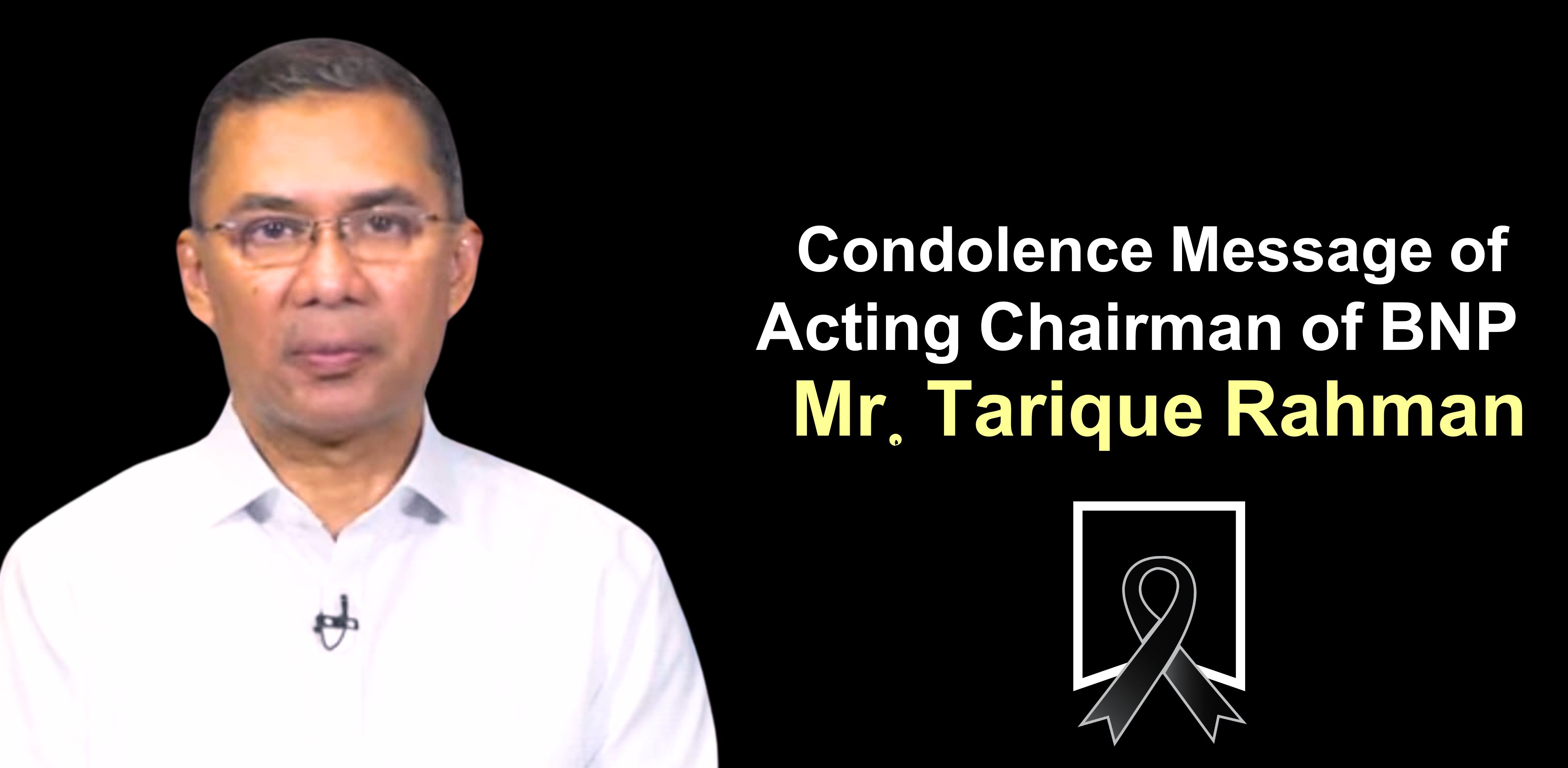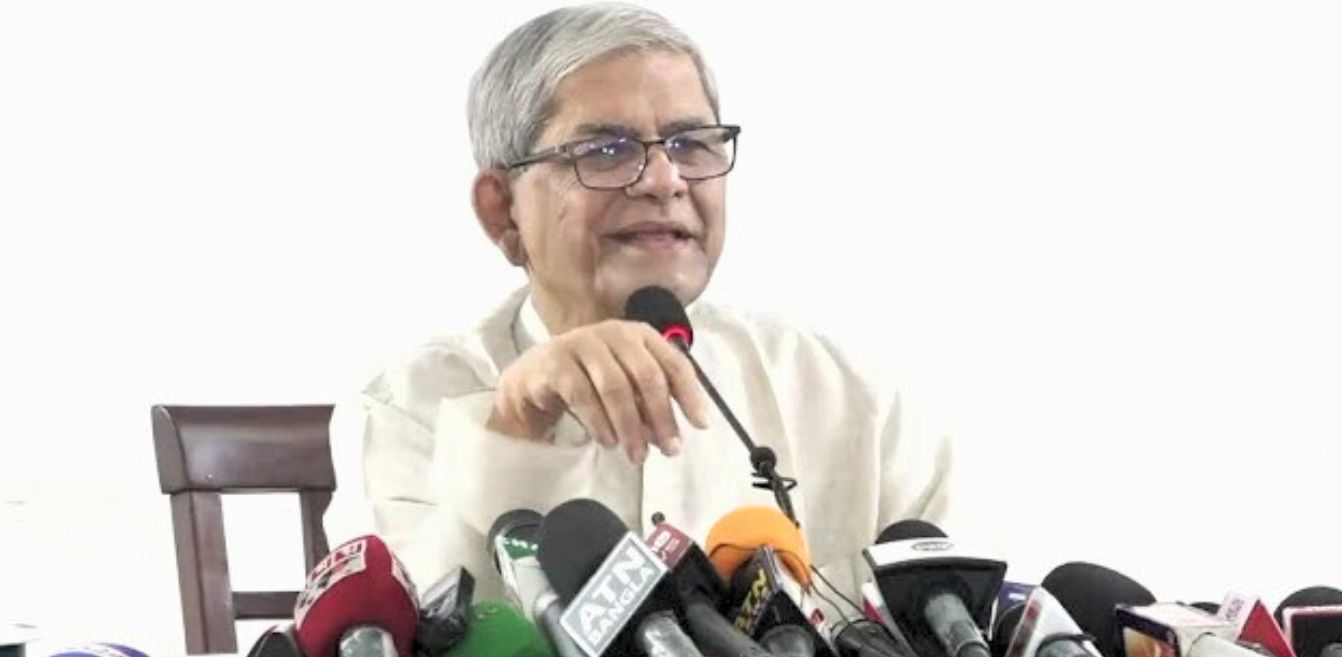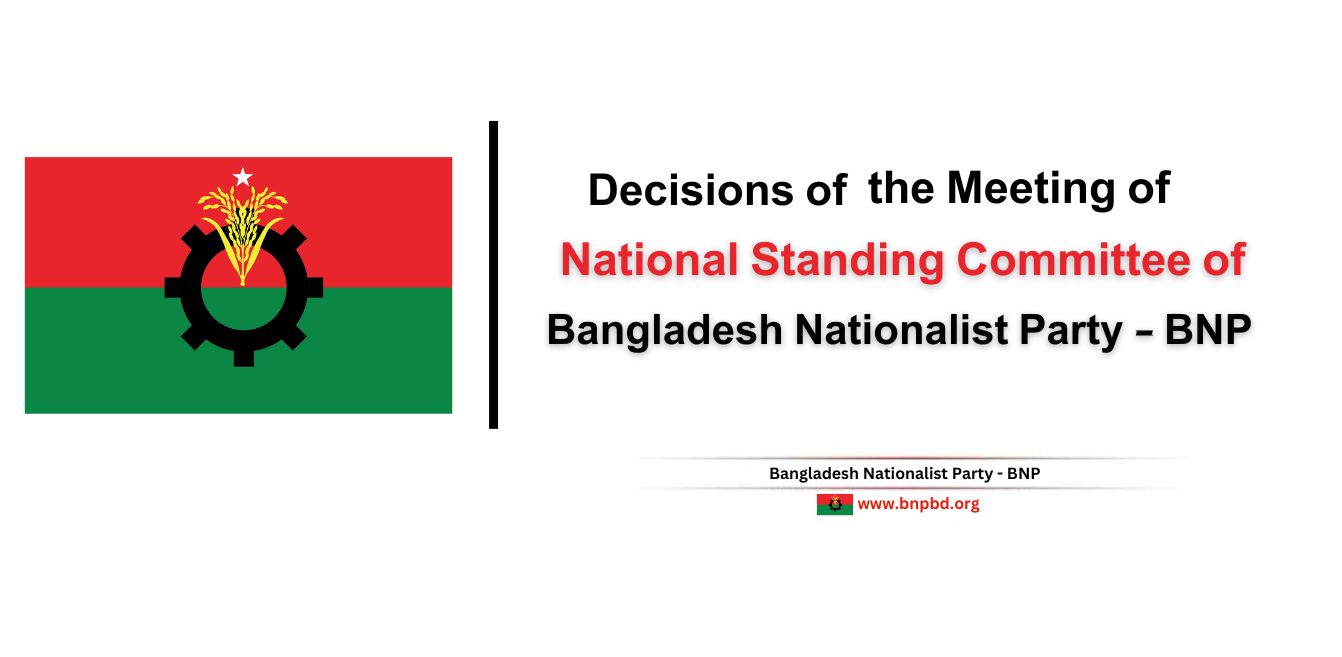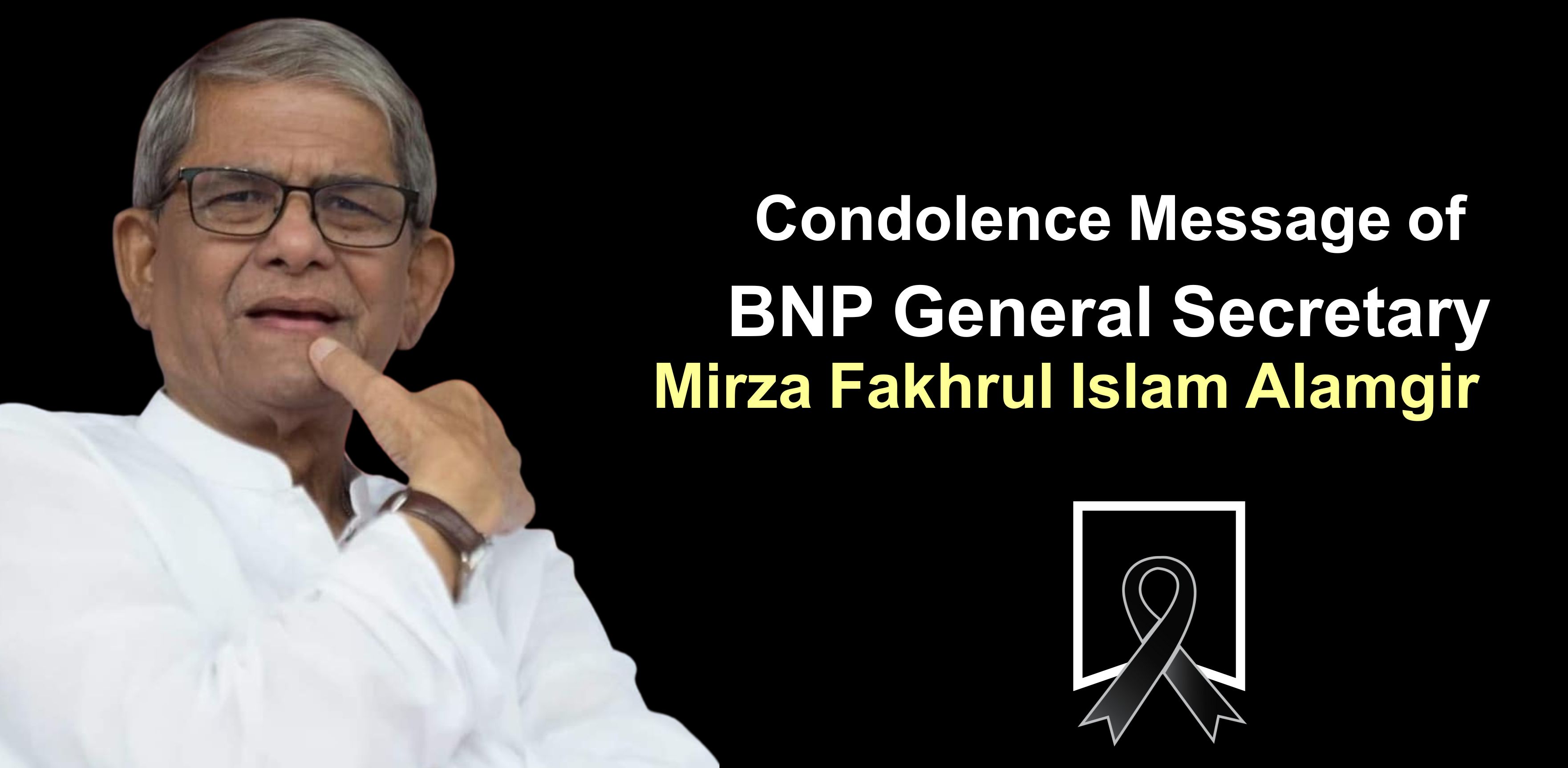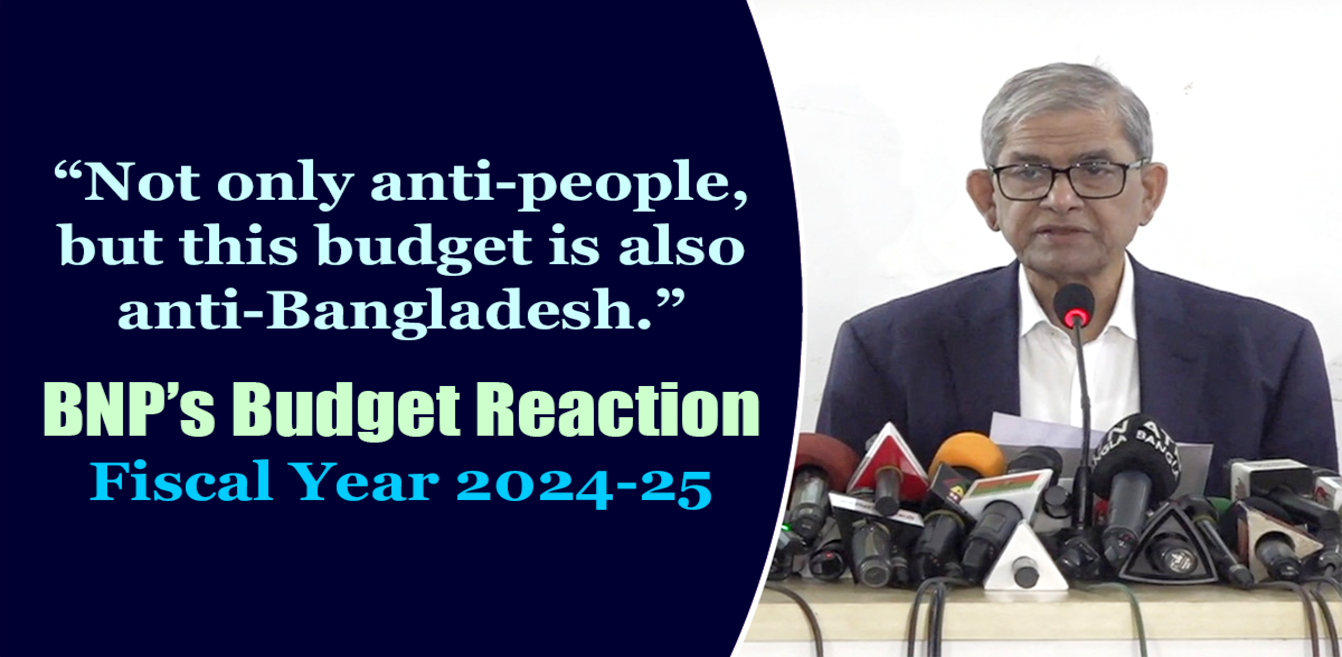
BNP’s Budget Reaction: Fiscal Year 2024-25
“Not only anti-people, but this budget is also anti-Bangladesh.”
Bismillahir Rahmanir Rahim
Dear journalists, brothers, and sisters,
Assalamu Alaikum.
An unelected government has been clinging to power for years without the public’s mandate. This government, which has violated laws and the constitution to create a dummy parliament through sham elections, has no moral right to present a budget. The people are the source of all power, yet they have been deprived of their right to vote. This government is an illegitimate, unrepresentative regime. The proposed budget for the fiscal year 2024-25 is merely a crafted tool to exploit the ordinary poor people of the country. The current plundering government’s budget serves only a handful of oligarchs who are not only stealing but also running businesses, formulating policies, and controlling the entire country. The nation is on the brink of bankruptcy. This budget is an illusion, standing on a hollow economy.
The resources needed to formulate the budget have been looted by these oligarchs. The banks are empty. Under the patronage of the government, the oligarchs have drained the banks by taking loans. Most of this money has been laundered abroad. Depositors cannot cash their cheques in banks. There is unprecedented despair among the people. However, this despair does not affect the newly wealthy, who are beneficiaries of the government’s blessings. They are thriving by exploiting ordinary people, while the poor are becoming poorer. At any moment, the patience of the people may break. Meanwhile, Bangladesh’s reserves have plummeted. There isn’t enough dollar reserve to cover three months of import expenses. Due to the lack of dollars, business and trade are at a standstill. The debt has increased so much that a large portion of the budget is spent on repaying it. They will steal electricity, and ordinary people will have to pay unbearable bills. The same is true for water and gas. To implement this so-called budget, the proposal is to burden the public with taxes. This budget is tax-dependent, debt-dependent, and pro-plunderer. Amidst unbearable inflation, the general public is in dire straits, and on top of that, they face the burden of taxes. Expecting a welfare-oriented budget from an unaccountable government is foolish. This budget is nothing more than a shameless list of domestic and foreign loans and taxes imposed on the general public. This budget, on one hand, is a cruel joke on the collapsing financial institutions immersed in rampant corruption and, on the other hand, a harsh reality for the economic hardship of the masses. It is indeed a tragic and heartbreaking deception of the people.
Dear Journalists,
Bangladesh is currently under the grip of plunderers. The proposed budget is a scheme to legitimize their theft, planning to further loot the country’s resources. Expenditures are set significantly higher than income, placing the entire burden on ordinary citizens. Large, debt-based budgets with deficits have not been feasible in the past and will not be in the future. Taxpayers have no faith in an unelected government. This year, we need to pay interest on $12 billion of domestic and international loans. This budget is essentially built on nothing. Out of the 7.97 trillion BDT budget, 2.56 trillion BDT is a deficit, proposed to be covered by 1.5 trillion BDT in domestic loans and 1 trillion BDT in foreign loans. It’s a scheme to repay debt with more debt—a classic case of “frying fish in its own oil.” Moreover, these loans will be taken under sovereign guarantees, as Bangladesh has lost the capacity to provide collateral. Recently, Fitch Ratings, one of the Big Three credit rating agencies, downgraded Bangladesh’s long-term credit rating again. Previously, Moody’s and S&P had also downgraded Bangladesh’s credit rating. The question arises: who will trust this bankrupt government enough to lend it money? Consequently, the government will lean towards hard foreign loans with stringent conditions, further trapping the country in debt. By year-end, the economy is bound to collapse. The burden won’t fall on the government or its beneficiaries but on ordinary citizens, leaving the helpless and poor to suffer.
Present Journalists,
This budget has no directives for job creation. Claiming a dollar crisis, imports have been curtailed, leading to a near blockade on capital machinery and raw materials imports, causing factories to shut down. Banks are empty, and interest rates are high. With the government borrowing vast amounts from banks, the private sector’s access to loans has diminished, stagnating private investment. Direct Foreign Investment (DFI) is also at an all-time low. Over 3,000 industries, especially in the garments sector, have shut down or are on the verge of closure. There are no new job opportunities; thousands of workers are returning to villages where there are no employment opportunities, creating a dire situation. This budget offers no hope for new employment opportunities. There is no roadmap for rehabilitating jobless and distressed workers. Although the budget speech mentions measures to improve macroeconomic indicators, there are no practical directives in this budget.
Dear Journalists,
This budget is not just anti-people; it is anti-Bangladesh. The very people who form the foundation of Bangladesh are now facing existential threats. The entire budget is crafted for mega-projects and mega-theft, fostering corruption. In the current precarious economic situation, it would have been wise to halt unnecessary mega projects or non-productive visible infrastructure. Funds from these projects could be redirected to critical public welfare sectors like education, health, and agriculture, and expand social safety nets. However, stopping these projects would also halt the corruption pipeline, which is why it wasn’t done.
This year’s allocation for the education sector is only 1.69% of GDP, down from 1.76% this year, 1.83% in 2022-23, and 2.08% in 2021-22. The current anti-people government is continually reducing the allocation for education. This budget allocates only 0.74% of GDP for the health sector, which is grossly inadequate. You know that if the BNP is elected and given the opportunity to serve again, it has pledged to allocate 5% of GDP to the education and health sectors. The current government has also reduced allocations for agriculture, despite agriculture being proven once again as the backbone of our economy during the COVID-19 pandemic. Instead of aiding farmers, the government has funneled trillions of taka in subsidies under the guise of capacity charges into the hands of oligarchs in the power sector, often without even purchasing electricity. On one hand, they claim a production capacity of 27,000 MW, and on the other, they purchase high-cost electricity from the Indian Adani company, paid in dollars. Economists have called this agreement unequal and against national interests.
Dear Journalists,
The current budget is designed to launder black money, offering broad amnesty to those with illicit funds. By paying a 15% tax, individuals and companies can legalize their black money without any government agency questioning them—granting full immunity. This approach discourages honest taxpayers and officially encourages corruption. Providing such a license for corruption is illegal, unethical, and unconstitutional. While honest taxpayers face a maximum tax rate of 30%, those with black money can regularize their funds at just 15%, which is discriminatory and violates Article 20(2) of the Constitution. The government's claim of “zero tolerance” against corruption is both unethical and contradictory. It is clear that this corrupt government is granting this license to benefit those who have accumulated illegal wealth. This scheme is designed to benefit corrupt individuals like Aziz and Benazir, who have thrived under government patronage. Although this process may generate some revenue, overall, it will disrupt the revenue collection process. This budget is essentially a concession contract, benefiting the ruling Awami government and its mafia leaders by dividing the spoils of corruption. It is evident that this budget is crafted to profit a few individuals who help this illegitimate government cling to power. The negative effects of this budget will not only impact the coming year but will also burden the nation for the next decade.
Dear Journalist Brothers and Sisters,
People are being crushed under severe market inflation. Even essential items have become luxury goods. Under the immense pressure of inflation, people’s lives have become unbearable. Prices of all goods in the market have skyrocketed. People can’t afford to buy anything and are depleting their savings, with many having no savings left. In this situation, buying nutritious food like fish, meat, and eggs has become impossible. People can no longer bear this burden. According to government statistics from the Bangladesh Bureau of Statistics (BBS), general inflation was nearly 10% last May, with food inflation at 12%. However, economists argue that the actual inflation rate is closer to 20%. If you visit the markets, you’ll see that inflation has exceeded 50% over the past year. The World Bank has questioned the reliability of BBS’s data, considering it unreliable. Blaming BBS is futile since revealing the true figures could cost them their jobs. When protectors become predators, this outcome is inevitable.
The government has set an inflation target of 6.5% in this budget but has provided no guidance on how to achieve it. It’s widely known that prices have surged due to some government-favored syndicates. The budget offers no discussion on how to control these syndicates, providing no relief for the common people.
Dear Journalists,
Over the past 15 years, under government shelter, non-performing loans have skyrocketed. In 2009, the banking sector had 224.81 billion BDT in bad loans, which has now increased to 1.82 trillion BDT, with only 177.05 billion BDT short of the 2 trillion BDT milestone. In just the past three months, bad loans have increased by 366.92 billion BDT, rising from 9% to 11%. Although the manifesto promises to continue enforcing laws to reduce bad loans, in reality, they keep increasing. Even the finance minister admitted that it will take time to reduce bad loans, which is another form of deception. Meanwhile, people’s conditions worsen daily as they indirectly bear the burden of these bad loans.
Present Journalists,
The government may think it has presented a substantial budget, which is about 5% larger than the previous year. However, previous years saw annual increases of 10-11%. Considering the value of money in the previous fiscal year, the budget amounts to 5.33 trillion BDT in dollar terms. Additionally, 97% of the 2.65 trillion BDT development budget will have to be sourced through begging. Is Bangladesh, in the name of development, falling back into the debt trap of 40 years ago? The smaller size of the budget compared to previous years proves that the economy, which the Awami League propaganda machine inflated, is actually deflating. Although a GDP growth rate of 6.75% has been proposed, achieving this is unlikely. The World Bank predicts a growth rate of 5.6%. Nearly two-thirds of the budget’s 4.69 trillion BDT will go towards non-productive sectors such as salaries, incentives, allowances, and subsidies. Without production, where will growth come from?
Dear Journalists,
As you are aware, the proposed budget of BDT 7.97 trillion allocates BDT 5.06 trillion for operational expenses and BDT 2.81 trillion for development expenditure, with a revenue target of BDT 5.45 trillion, including grants. This means there is a significant shortfall in revenue compared to expenditures. The National Board of Revenue (NBR) is expected to generate BDT 4.8 trillion, leaving a budget deficit of BDT 2.56 trillion. To bridge this gap, the government plans to borrow BDT 907 billion from foreign sources and BDT 1.61 trillion from domestic sources, with BDT 1.375 trillion from banks and BDT 234 billion from non-bank loans.
According to the Ministry of Finance’s Debt Bulletin, government debt has increased by over BDT 5 trillion in the past two and a half years. As of June 30, 2021, the debt stood at BDT 11.44 trillion and has risen to BDT 16.59 trillion by December 2023. This substantial debt places the economy at significant risk. Recent government projections indicate that total government debt will exceed BDT 27 trillion in the next three fiscal years.
The budget for the upcoming fiscal year allocates BDT 1.135 trillion for interest payments, which is 14.24% of the total budget. Over the past six years, interest expenses have doubled. Operational costs will also be met through borrowing. Domestic interest payments amount to BDT 930 billion, and foreign interest payments are BDT 205 billion. The loans taken for mega projects and other initiatives will need to be repaid in the coming years, further increasing the debt burden. Last year, the per capita debt burden was BDT 100,000, which has now risen to BDT 155,000. Every newborn in Bangladesh is effectively born with a debt burden of BDT 155,000. The overall economy is now heavily indebted. The economic infeasibility of these loans for mega projects is compromising our entire economy to both domestic and foreign oligarchs, an issue that the budget has effectively ignored.
Dear Journalists,
Bangladesh is on the brink of bankruptcy. The International Monetary Fund (IMF) has had to lower its foreign exchange reserve target from USD 20.10 billion to USD 14.769 billion, likely because it couldn’t find a way to save the economy. Despite this adjustment, the situation remains dire as the reserves have dropped below USD 13 billion. Banks are unable to open Letters of Credit (LCs) due to a lack of dollars. Several foreign companies, including U.S. firms and airlines, cannot be paid. The International Air Transport Association (IATA) has repeatedly demanded overdue payments, leading some airlines to reduce flights, which negatively impacts trade and commerce. Many foreign investors are withdrawing investments and placing their funds in U.S. Treasury bills and bonds instead, putting financial accounts under pressure. As of last March, the balance of payments deficit was USD 9.26 billion, compared to USD 2.93 billion the previous year. Previously, financial accounts had always been in surplus. The dollar reserve is depleting rapidly, yet there is no roadmap in the budget to overcome this reserve crisis, despite it being one of the primary economic challenges.
Without effective measures to control money laundering and illegal money transfers (hundi), attempts to stabilize the dollar market will fail. Recently, the media reported the brutal murder of a dummy parliamentarian in a neighboring country, revealing his involvement in gold smuggling and other syndicates, allegedly supported by powerful government figures. This case has made it clear to the public who receives the current ruling party’s MP nominations and who runs this government, exemplified by figures like the so-called MP Anwarul Azim Anar.
Dear Journalists,
The disparity between the rich and the poor in our country is increasing daily. The biased policy framework in this budget will further widen the gap in income and wealth. The Gini coefficient has been rising continuously for the past 12 years, reaching 0.99 in 2022. The unbearable conditions faced by lower-middle and middle-class families, struggling to make ends meet, are ignored by the government. The elites in the ruling class do not hesitate to propose separate universities for their own children.
According to a report published by UBS Bank in Switzerland in September 2023, despite various economic crises, the number of billionaires in Bangladesh has reached 1,700, who control 10% of the country’s GDP. In fact, a legal framework has been created in this budget to whiten black money with just a 15% tax, effectively providing an opportunity for this group to legitimize their illicit wealth.
Money laundering is continuously increasing. GFI reports that between 2009 and 2018, USD 49.65 billion was laundered from Bangladesh under the guise of foreign trade. According to a CID (Criminal Investigation Department) report, in one year, hundi traders laundered an equivalent of BDT 750 billion, or USD 7.8 billion. Combined with other means, at least BDT 1.5 trillion is being laundered abroad annually. Everyone in Bangladesh is aware of the luxurious “Begumpara”, “Second Homes”, residential properties, and wealth established abroad. The only ones unaware are the government. How can they be aware when they are complicit? Many believe that in the last 15 years, an amount equivalent to six years of the national budget has been laundered abroad under the current government. Most of those involved in this laundering are blessed by the government and the ruling party. Although hundreds of corrupt individuals and traffickers like Aziz and Benazir have been identified, many have not been prosecuted in the past 15 years. They escape safely with the help of the ruling party, putting the country and its ordinary people at risk. It is impossible for this government to catch the corrupt because it is in power with their support.
Dear Journalist Colleagues,
The proposal to borrow a massive amount from the banking sector to meet the budget deficit will severely hamper private sector investment. It will have a significant impact on the money market. Banks are already facing a liquidity crisis and are unable to cash cheques for 50,000 BDT from depositors, leading to widespread distress. If the government borrows such a huge amount from these already dry banks, the liquidity crisis will worsen dramatically. Depositors will face ruin. With millions already unemployed, hampered investment will prevent job creation, worsening economic stagnation. The future looks bleak. In this challenging time of extreme political and economic crisis, this conventional budget offers no solutions.
Dear Journalists,
The current government, detached from the people, has increased the tax burden in the budget, worsening the already dire situation of ordinary citizens crushed by inflation. Prices for all commodities began rising as soon as the budget proposal was announced. Notably, this budget includes no reforms to increase revenue, ignoring the advice of the IMF, despite using IMF conditions as a pretext to hike electricity and fuel prices multiple times. It is said that electricity prices will be increased four times a year. Even the WASA (Water Supply and Sewerage Authority) water bill has been raised 16 times in the last 16 years. The public is at their breaking point, and a mass uprising could occur at any time. Rather than planning to collect taxes from evaders, the focus is on extracting additional taxes from those who regularly pay. Although there is talk of a ‘Digital’ or ‘Smart’ Bangladesh, the cost of mobile phone calls and internet services has increased. The import duty on laptops has risen, and there is a 15% tax increase on printers once again. The government’s promises to make information technology more accessible appear to be empty assurances.
Excise duties on bank deposits have been adjusted across various tiers. The tier for deposits ranging from BDT 1 million to 10 million has been broken down into several tiers. Similarly, the tier for deposits between BDT 10 million and 50 million has been fragmented. This government is more focused on extracting money from the public.
Very few products have seen a reduction in customs duties in this budget. Taxes on essential and daily-use items, which have been continuously rising, have not been reduced.
A government that itself violates laws and the constitution cannot restore financial and administrative discipline. The Bangladesh Bank has become hostage to a few greedy oligarchs and corrupt politicians. There are no initiatives in this budget to reduce government expenditures, establish control and discipline in the banking sector, or implement fundamental reforms in the financial sector.
Dear Journalists,
Rampant corruption has engulfed Bangladesh from all sides. The country is mired in a severe economic and political crisis, primarily due to the lack of good governance and accountability in the current government. There is only one way out of this crisis: to save the country from the grip of these corrupt rulers. We must restore democracy, rescue the people from misrule and rampant corruption, and establish an accountable government through a free, fair, and impartial election.
The deceitful notion of ‘development first, democracy later’ must end, and the 180 million democracy-loving people of Bangladesh must be given the opportunity to exercise their voting rights freely and fairly.
We engaged in a brutal struggle for our independence to establish democracy, equality, and justice. At any cost, we will restore democracy in this country, Inshallah. Good governance will be re-established in this land. Budgets aimed at public welfare and the economic rights of the underprivileged will once again be formulated by a national parliament elected by the people’s mandate. This is the unwavering commitment of the BNP to the people of Bangladesh.
Allah Hafez, Bangladesh Zindabad.
Mirza Fakhrul Islam Alamgir
Secretary General
Bangladesh Nationalist Party (BNP)

.png)
